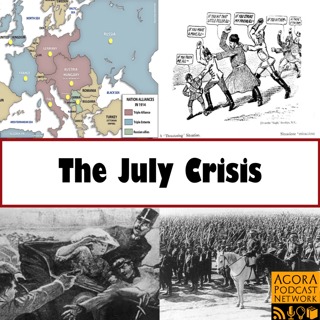Om avsnittet
As Belgrade burned with rage following the death of Ambassador Hartwig, Berchtold was on the verge of his greatest triumph. After several intense weeks of pressure, Stefan Tisza seemed finally to be seeing the light. A combination of factors, including German pressure, agitation from his subordinates, fear of Romania, outrage at Serbia, and probably exhaustion, all moved Tisza to accept a policy of war. Tisza was eager to clarify that this did not render him a hawk - he still wished for peace if this was possible. Yet, he no longer blocked the construction of an ultimatum designed to be impossible for Serbia to accept, and he no longer flew the lonely flag for diplomacy. How had Tisza been persuaded, and what did it mean for Berchtold, to finally have a united Cabinet behind him? Here we consider these critical questions, in a pivotal turning point of the July Crisis.Support the July Crisis series, join the conversation, and find out more through these links:Do you want ad-free episodes with scripts attached, and bonus content? Support us on Patreon and you can suggest July Crisis episodes!Join our Facebook group as we make our way through this fascinating series!Click here to see our July Crisis workspace in Perlego, you'll find every source you need! Get bonus content on Patreon Hosted on Acast. See acast.com/privacy for more information.

